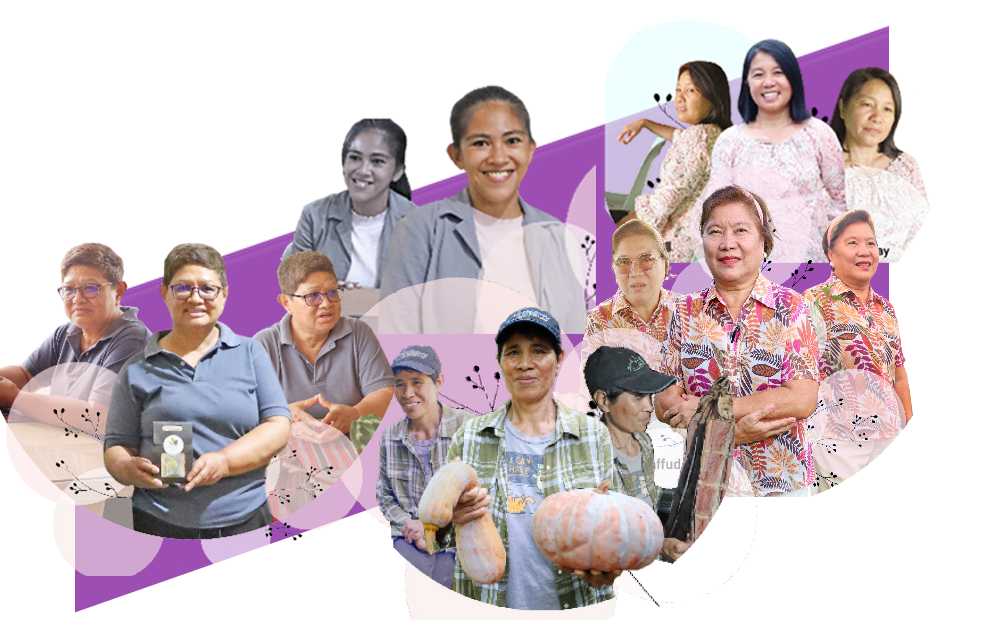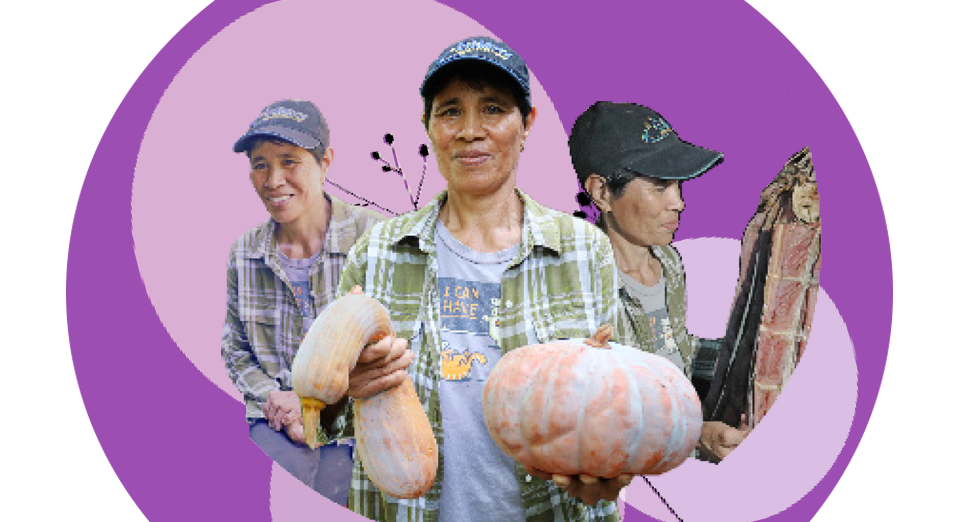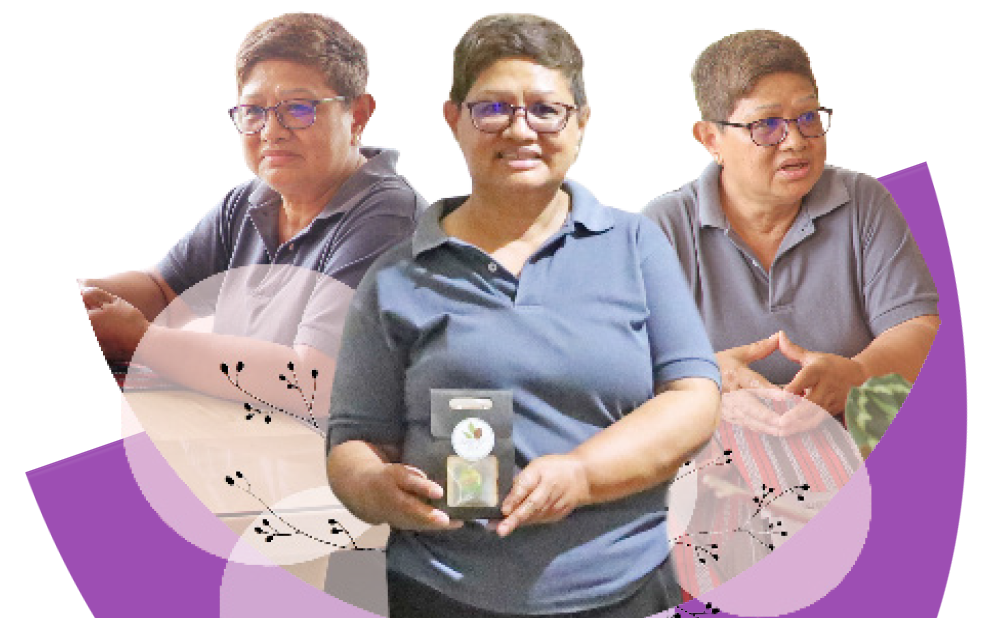
When thinking of Cagayan Valley Region, people are drawn towards the beauty of some of the most breathtaking landscapes in the country, amused by the scenic waters, terrains, agricultural plains, valleys, and bordered mountains like the majestic Sierra Madre or the Mother Mountain Range.
More than the picturesque views, these landscapes have contributed to the agricultural and fishery sector of the region, making it the “grains granary” of the Philippines and supplying most of the agricultural requirements of Metro Manila.
Just like the Sierra Madre that has been serving the backbone of Luzon – stretching from the provinces of Cagayan to Quezon– protecting the island from storm surges and typhoons from the Pacific Ocean, the women of the region have been determined to protect the agriculture and fishery industry from Batanes, Cagayan Province, Isabela, Nueva Vizcaya and Quirino.
These women have been using their voice stressing the importance of food security and how the industry could benefit from empowered and supported women, youth and Agricultural and Fishery Council (AFC) in the region.

Marilou Alina: The Mavakes who finds her voice and purpose on agriculture
Juggling her work as a Job Order at the Department of Agriculture (DA) from Mondays to Fridays, tending their own farm on Saturday and Sunday, and being a full-time mother and wife, Marilou has a lot on her plate.
The 57-year old Municipal AFC (MAFC) High Value Crops Sectoral Representative of Basco, Batanes and has been part of the AFC since 2018. Basco’s Municipal Agriculturist Dr. Rory Domingo first introduced MAFC to her.
“I know, the tasks of being part of MAFC will add to my tasks, I was convinced that I need to know DA’s programs and other interventions because this will be beneficial to my fellow farmers,” said Marilou.
As a mavakes or women in Batanes, she saw the opportunity by being part of the MAFC in giving feedback, voice out issues and concerns on the programs and projects of the Department.
“Women in Basco are well-represented. We are grateful that when we make suggestions, especially in MAFC, they listen to us because they know women here are well-rounded. I, for example, do the actual tilling of land, harvesting and other farm works,” she added.
One of the issues that she wants to highlight is the need of the farmers of rain collector, net for garden, fertilizer, organic pesticide and access to farm-to-market roads, not only in Basco, but also in all Batanes.
She mentioned that they have already raised it as a policy recommendation about it however, the rain collector has been challenging one.
In a statement from the Provincial Government of Batanes in October 2022, they were already in talks to various agencies and departments to find ways to fund the request of rain collectors and water impounding facilities to support the farmers and other agricultural programs in Batanes.
In a separate interview with MAFC Itbayat Chairperson Teodoro Gato, he confirmed that there were rain collectors in the island but it is for household use and these were not enough for the agricultural requirements of the farmers.
Aside from fresh water supply being scarce especially in the drought months of the island, most of the vegetable farms in Batanes are also located near the shores which are not suitable for growing crops and drinking of livestocks.
“We have other concerns here in Basco and it is important to involve the youth in agricultural activities because we want them to continue what we are advocating,” Marilou added.
In her simple ways, one of her neighbors was inspired to take up agriculture-related courses in a college in Basco. Aside from the 30 women officers and members of MAFC Basco, she also involved her sisters and neighbors in farm works for extra income.

Shirley Ann Garlitos: Young mother who aims more opportunities for mothers
Aside from the rich archeological site that hints at the traces of prehistoric colonization, the municipality of Ivana in Batanes stands out with the stories of a younger generation who aim to create a fresh start in the agriculture and fisheries industry.
Shirley Ann Garlitos has just started her own family and is still tending to her eight-month old daughter, but she already knows how to help the farmers and fishers, through MAFC in Ivana and how the policy resolutions can change everyone’s perspective.
“As the Public Information Officer of the MAFC Ivana, I can help the Council in strengthening the collaboration between the private stakeholders and the local government agencies for possible funding of projects for the farmers and fishers of Ivana,” Shirley said.
Fishing is the main source of living here in Ivana. While husbands are fishing, their wives are maintaining a backyard garden as additional income or source of food. She also mentioned that in Ivana, women are an integral part of the sector. The men were tasked to fish while the women were in charge of processing and selling the product.
Ivana MAFC Chairperson Florencia Pavilla has been encouraging the farmers and fishers, including women to share and voice out their concerns and suggest ideas on how to solve these.
“As one of the unfunded MAFCs, we are only required to meet twice a year but we will not limit ourselves in conducting more meetings because we are aiming to increase our members and craft more policy recommendations that could create more opportunities for all,” she added.
Some of the organizations that the Council have been supporting are the women organizations for solo parents who make Spanish-style libang or Flying Fish, infant-toddler feeding program, noodles and chips processing.
Although she just started in the Council in 2022, with the guidance and supervision of MAFC Ivana Chairperson Pavilla and other Council members, she knew she can contribute and inspire her generation to step up and be more involved in the development of the agriculture and fishery sectors in their area.

Perla Daguay: Saving lives and involving wives in decision making
The unspeakable pain of knowing that a child can lose life by an adult’s mishandling of pesticides and insecticides pushes Kasibu MAFC Chairperson Perla Daguay and the entire Council members to craft a resolution that would save other children in the municipality from danger.
In cooperation with Kasibu’s local government unit, the Council’s policy resolution that aims to strengthen the segregation of agricultural wastes was adopted in the entire municipality. In a report they received, the kid died after drinking from a colored neon green plastic soda bottle after it was used as a container to mix fertilizers.
According to the Nueva Vizcaya official website, the province has only 13 municipalities out of 15 that have a Material Recovery Facility (MRF). Kasibu is one of the municipalities that already have the MRF, however, residents need to be reminded of the harmful effects of desegregation, particularly with chemical containers.
Adside from the policy resolution, MAFC Kasibu also helped in information dissemination through conducting mobile meetings in different barangays.
Aside from this, Perla also took the opportunity to promote food security through economic activities particularly for women.
“I joined the AFC because as a woman, I can see and personally experience the issues in the sector. I was elected as the youngest MAFC Chairperson in Nueva Vizcaya and the Council members did not mind if I am a woman, a mother or the youngest, because we are all raising our voice for the stakeholders here in Kasibu,” she added.
Through the Council, programs like seed distribution, various aid, and training from the LGU were coursed through with them. Women representatives in Kasibu are part of the livelihood projects made especially for women like processing of turmeric ginger tea, tinapa making, pig dispersal, lending and other agricultural-related livelihood.
“In the MAFC meetings, we can say our problems and share solutions without the prejudice of being a woman,” she said.

Teresita Gaffud: From KIDS to mothers: introducing agriculture and marketing produce
They say it is never too early to start, especially with young minds.
Teaching children about the importance of agriculture and letting them enjoy the agricultural projects such as planting seeds, raising chickens, and harvesting produce can foster a sense of curiosity, promote creative problem-solving skills, and patience.
Teresita did not realize this when she started the Kabataan Inyo Ding Sundin or KIDS in 2005, she would plant essential seeds to her neighbors’ children when she tried to teach them to properly throw their garbage and separate the seeds of the fruit-bearing trees.
After her husband came back from the Middle East as a technician, the growing family of Tess decided to settle in Santiago City in 1992. She and her husband would juggle different kinds of jobs until she got a job for a college pre-need plan company.
They acquired properties because of her job at the company until it collapsed in the early 2000. While she needed to deal with the loss, she was also diagnosed with hyperthyroidism. During this challenging time, she saw an opportunity to introduce the world of agriculture to children through KIDS.
From seed segregation activity for the children, Tess also involved their mothers and started urban gardening and seedling distribution activities. In 2015, she became the Rural Improvement Club (RIC) president in Santiago City with 25 members. As a group, they advocated healthy meals for the children by planting vegetables in every barangay.
These communal gardens “by women, for women” became successful because they have harvested more than enough produce. Upon realizing these, she taught the members on how to market the crops to nearby barangays, for extra income.
A year later, she was able to share these marketing strategies with the AFCs when she became the CAFC women representative of Santiago City.
“Bilang babaeng member ng AFC, nadadagdagan ang aming kaalaman sa agrikultura tulad ng vermicomposting at mga iba’t-ibang innovations sa pagtatanim. Sa mga meetings at consultations, nalalaman namin ang mga proyekto ng LGU at ng DA para sa industriya.
Dahil itinutulak din namin dito sa Santiago City ang organic farming at mas ma-enganyo pa ang mga kabataan na magventure sa agriculture, nakakapag recommend kami ng mga policies na akma sa mga aming mga priority projects para food security,” Tess narrated in her interview.
She also expressed her appreciation to the LGU of Santiago City and its Mayor Atty. Alyssa Sheena Tan-Dy for the support to the AFCs and to all other agri-related organizations in the City.
“Hinihikayat nila ang mga kababaihan na mag-avail ng mga trainings at seminars as part of their technical assistance to farmers para mas ma-improve pa ang aming knowledge at mabigyan din kami ng confidence para magsimula,” she added.

Juliet Morales: Rising and grinding to revive Kasibu’s coffee industry
“Coffee trees used to be planted in most parts of Kasibu. Karamihan, Robusta yung nakatanim. Maganda ang lupa at klima rito sa amin, perfect for the coffee trees,” Juliet looked back.
Kasibu used to be the coffee capital in some parts of Nueva Vizcaya until the decline of coffee bean prices discouraged farmers from maintaining the trees. From brewing a flavorful taste of success, the coffee industry simmered down in the late 1990s.
The MAFC Coffee and Cacao Sectoral Representative believed that there will come a time that the Kasibu farmers will agree to plant and tend coffee trees again given the town’s favorable coffee-growing condition. Juliet also needed to convince her fellow farmers by presenting a workable business concept.
In 2014, her son, who is an agricultural engineer, went to Davao for the Philippine Coffee Board and met Pacita “Chit” Juan of the organization. The social entrepreneur and advocate for women’s empowerment, along with Nicholas Matti of the Philippine Coffee Board Inc., advised them to revive the coffee industry in Kasibu.
“I tried to convince my brother, who was the mayor that time but unfortunately, he thinks this will not succeed. Some of our neighbors were unconvinced that this would become a success. There is an Ilocano belief that says ‘dyak pati, dyak kita’. And I have to prove that it will work,” Juliet shared.
She coordinated with the Department of Agriculture (DA) Regional Field Office II, particularly with Karol Albay of DA High Value Crops Development Program (HVCDP) for training, programs and projects, joined the Cagayan Valley Coffee Industry Cluster, and made partnerships with private sectors like the Oceana Gold Mine (OGM).
The training and partnerships, particularly with OGM, led them to acquiring seedlings, farm inputs, a roasting machine, and a pulverizer.
In 2019, Juliet applied for a grant from the Department of Trade and Industry for a bigger coffee roaster to accommodate the increasing coffee beans supply from their coffee farmers. They needed to roast 100 packs of 250 grams of coffee ground.
With her experience with OGM, Juliet saw the importance of monitoring to ensure the success of a project. In 2019, Juliet was invited by DA RFO II to be part of the sectoral committee of Cagayan Valley RAFC.
“I was curious about the AFC. The meetings were time consuming but the discussions were crucial because we were able to know the existing programs, activities and projects of DA for our sector. Unfortunately, I also saw some program mismatch and it even strengthened my belief that there should be consistent monitoring,” she added.
In 2020, their organization was able to get a building and their own grinder from the DA. Aside from representing the coffee sector in RAFC, she also became the coffee sectoral representative at the National Sectoral Committee, expanding her connections in the industry.
In 2021, then HVCDP Director U-Nichols Manalo suggested to her to pass a resolution for an extension of their organization’s building to accommodate the increasing demand of coffee from Kasibu.
“The building became our processing center and we employ single parents, person-with-disabilities, and housewives. We also gave part time jobs for students. I hope that when the effects of the Climate Change hit the coffee industry, we were able to sustain the this bulk and continue to give livelihood not only to the coffee farmers but also to their families,” she added
Juliet already requested from DA and OGM a water system for the association and they are still waiting for water pumps that will supply enough water for the coffee trees.
“We were not only able to bring rise to the coffee industry, but we were also able to create jobs. Maybe we also proved that the men, women, and the youth of Kasibu can work together and make Kasibu coffee or the KasiBrew glorious again,” the woman leader concluded. | Jezebel Campaniel











